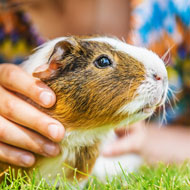Rise in vets treating small furries for heat-related conditions

Two-thirds of vets saw animals requiring treatment for hot weather-related conditions last summer.
The British Veterinary Association (BVA) has reported an increase in the number of companion animal vets treating smaller pets for heat-related conditions.
Figures from the BVA’s Voice of the Veterinary Profession Survey found that almost two-thirds of vets (64%) saw animals requiring treatment for conditions relating to hot weather in 2018 - a figure significantly higher than in previous years, with 48 per cent reporting in 2016 and 40 per cent in 2015.
In light of the recent heatwave, the BVA is reminding pet owners to protect small furries from soaring temperatures by keeping them away from direct sunlight and with plenty of fresh water.
BVA junior vice president, Daniella Dos Santos said: “We all know how important it is to stay cool and hydrated in hot weather. Pets can really suffer in such high temperatures and we should not forget that small furries will need help to cope.
“In the wild, rabbits and guinea pigs would hide away during the hottest points of the day and feed in the mornings or evening. It is up to owners to help protect pets from extreme temperatures so remembering to provide shade and plenty of fresh water as well as keeping hutches and cages out of direct sunlight and well.”
The BVA’s Voice of the Veterinary Profession survey also reveals that 54 per cent of vets saw multiple cases last summer of animals requiring treatment owing to hot weather, with one in five vets (20%) reporting more than six such cases.
Vets working in companion animal practice or mixed practice were most likely to have treated dogs for heat-related conditions (64% and 66% respectively), with smaller but significant numbers of companion animal vets having seen cases in rabbits (15%) and cats (11%).



 The latest
The latest